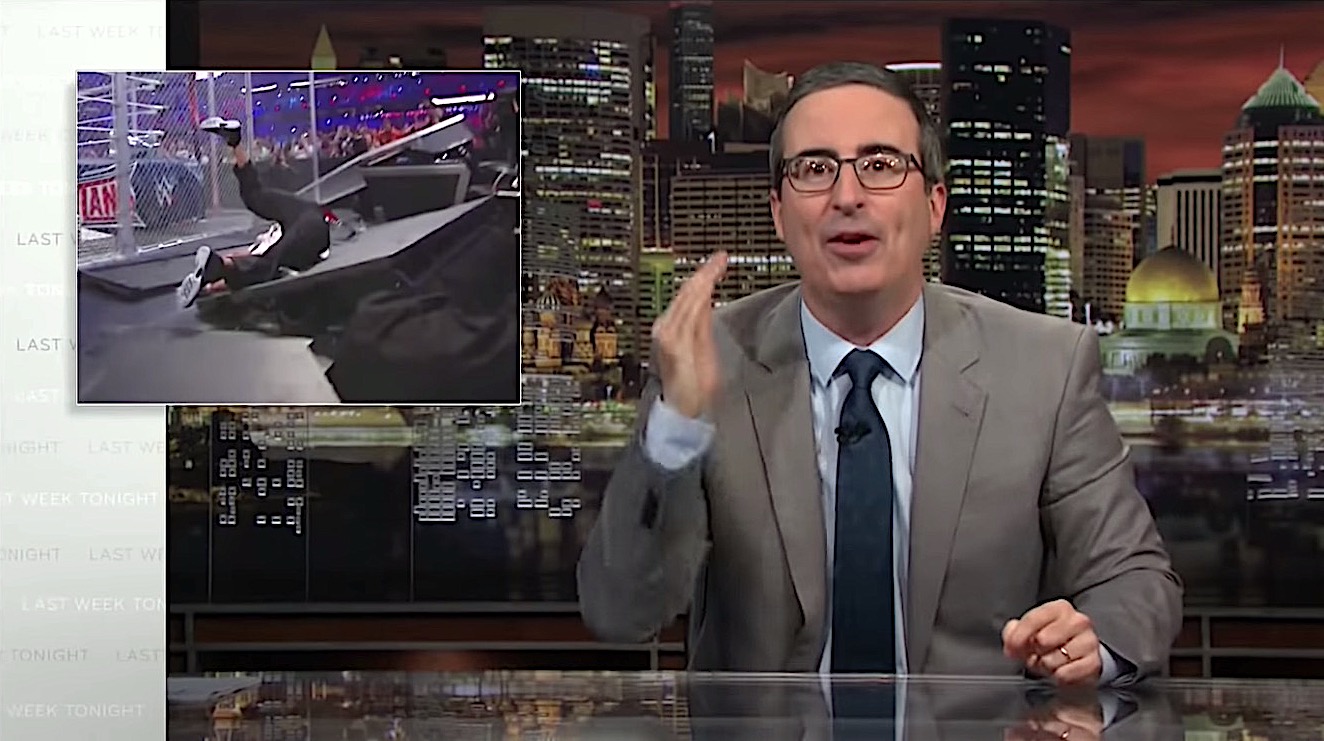John Oliver wants to force the WWE to treat its wrestlers better. His plan involves fellow wrestling fans.


A free daily email with the biggest news stories of the day – and the best features from TheWeek.com
You are now subscribed
Your newsletter sign-up was successful
John Oliver dedicated the bulk of Sunday's Last Week Tonight to "professional wrestling, literally the only good excuse to wear a onesie — and that's right, babies, you're not pulling it off." Specifically, Oliver focused on "the undisputed corporate champion of wrestling, the WWE," and its "incredibly powerful" chairman and CEO, Vince McMahon, who "eliminated or absorbed" regional wrestling competitors throughout the 1980s and '90s to essentially form a wrestling monopoly.
Look, "I like wrestling," Oliver said. "It's objectively entertaining," and the WWE has "delivered numerous ludicrous and genuinely incredible moments," some of which he played. That's why WWE's WrestleMania is the No. 6 most valuable sports brand, just below the World Cup and four slots above the World Series, he said. But the wrestlers themselves die early at a "shockingly high" rate, and many fans "legitimately hate" McMahon "because while the WWE has made him a billionaire, many wrestlers say he's treated them terribly," and he has "shielded himself from responsibility for his wrestlers' welfare" to a "shocking" degree, mostly by ludicrously labeling them "independent contractors."
"When you take all of this together — with wrestlers working as independent contractors in a monopolized industry largely free form meaningful oversight and able to be fired at any time — you wind up with an environment with huge potential for unsafe conduct," Oliver said. Wrestling fans "really care about these wrestlers," even "long after the WWE has abandoned them," but fans shouldn't have to crowdfund their health care and funeral costs.
The Week
Escape your echo chamber. Get the facts behind the news, plus analysis from multiple perspectives.

Sign up for The Week's Free Newsletters
From our morning news briefing to a weekly Good News Newsletter, get the best of The Week delivered directly to your inbox.
From our morning news briefing to a weekly Good News Newsletter, get the best of The Week delivered directly to your inbox.
"Even the NFL, for all its massive faults, now offers players health reimbursement accounts and have established a legacy fund for older players who may be dealing with health issues," Oliver said. "And when you've lost the moral high ground to the f--king NFL, you are morally subterranean." He offered a plan for how the WWE's influential fans might force a change at next week's live WrestleMania, laid out in a familiar format. (There is NSFW language.) Watch below. Peter Weber

A free daily email with the biggest news stories of the day – and the best features from TheWeek.com
Peter has worked as a news and culture writer and editor at The Week since the site's launch in 2008. He covers politics, world affairs, religion and cultural currents. His journalism career began as a copy editor at a financial newswire and has included editorial positions at The New York Times Magazine, Facts on File, and Oregon State University.
-
 Local elections 2026: where are they and who is expected to win?
Local elections 2026: where are they and who is expected to win?The Explainer Labour is braced for heavy losses and U-turn on postponing some council elections hasn’t helped the party’s prospects
-
 6 of the world’s most accessible destinations
6 of the world’s most accessible destinationsThe Week Recommends Experience all of Berlin, Singapore and Sydney
-
 How the FCC’s ‘equal time’ rule works
How the FCC’s ‘equal time’ rule worksIn the Spotlight The law is at the heart of the Colbert-CBS conflict
-
 ‘One Battle After Another’ wins Critics Choice honors
‘One Battle After Another’ wins Critics Choice honorsSpeed Read Paul Thomas Anderson’s latest film, which stars Leonardo DiCaprio, won best picture at the 31st Critics Choice Awards
-
 A peek inside Europe’s luxury new sleeper bus
A peek inside Europe’s luxury new sleeper busThe Week Recommends Overnight service with stops across Switzerland and the Netherlands promises a comfortable no-fly adventure
-
 Son arrested over killing of Rob and Michele Reiner
Son arrested over killing of Rob and Michele ReinerSpeed Read Nick, the 32-year-old son of Hollywood director Rob Reiner, has been booked for the murder of his parents
-
 Rob Reiner, wife dead in ‘apparent homicide’
Rob Reiner, wife dead in ‘apparent homicide’speed read The Reiners, found in their Los Angeles home, ‘had injuries consistent with being stabbed’
-
 Hungary’s Krasznahorkai wins Nobel for literature
Hungary’s Krasznahorkai wins Nobel for literatureSpeed Read László Krasznahorkai is the author of acclaimed novels like ‘The Melancholy of Resistance’ and ‘Satantango’
-
 Primatologist Jane Goodall dies at 91
Primatologist Jane Goodall dies at 91Speed Read She rose to fame following her groundbreaking field research with chimpanzees
-
 Florida erases rainbow crosswalk at Pulse nightclub
Florida erases rainbow crosswalk at Pulse nightclubSpeed Read The colorful crosswalk was outside the former LGBTQ nightclub where 49 people were killed in a 2016 shooting
-
 Trump says Smithsonian too focused on slavery's ills
Trump says Smithsonian too focused on slavery's illsSpeed Read The president would prefer the museum to highlight 'success,' 'brightness' and 'the future'
